From today's WSJ
+9
Admin
Kenny B.
Mike MacLellan
Michele "1L" Keane
Michael Mitchell
Mark B
JohnP
mountandog
Michael Enright
13 posters
Page 1 of 1
 From today's WSJ
From today's WSJ
From today's WSJ - interesting article - since I'm 56, it caught my eye:
In a five-kilometer race Thanksgiving morning, Ralph Foiles finished first in his age group, earning the 56-year-old Kansan a winner’s medal.
Or was it a booby prize?
A fast-emerging body of scientific evidence points to a conclusion that’s unsettling, to say the least, for a lot of older athletes: Running can take a toll on the heart that essentially eliminates the benefits of exercise.
“Running too fast, too far and for too many years may speed one’s progress toward the finish line of life,” concludes an editorial to be published next month in the British journal Heart.
Until recently, the cardiac risk of exercise was measured almost exclusively by the incidence of deaths during races. For marathoners, that rate was one in 100,000—a number that didn’t exactly strike fear. Moreover, data showed that runners generally enjoyed enormous longevity benefits over nonrunners.
What the new research suggests is that the benefits of running may come to a hard stop later in life. In a study involving 52,600 people followed for three decades, the runners in the group had a 19% lower death rate than nonrunners, according to the Heart editorial. But among the running cohort, those who ran a lot—more than 20 to 25 miles a week—lost that mortality advantage.
Meanwhile, according to the Heart editorial, another large study found no mortality benefit for those who ran faster than 8 miles per hour, while those who ran slower reaped significant mortality benefits.
Those two studies—presented at recent medical conferences—follow the publication in recent months and years of several other articles finding cardiac abnormalities in extreme athletes, including coronary artery calcification of a degree typically found in the utterly sedentary.
Meghan Newcomer is a 32-year-old professional triathlete who has passed out during several races in recent years.
Opinion is nearly unanimous among cardiologists that endurance athletics significantly increases the risk of atrial fibrillation, an arrhythmia that is estimated to be the cause of one third of all strokes. “Chronic extreme exercise appears to cause excessive ‘wear-and-tear’ on the heart,” the editorial says.
Not everyone is lining up behind the new data. “The guys advancing the hypothesis that you can get too much exercise are manipulating the data,” said Paul Thompson, an elite marathoner and nationally renowned sports cardiologist at Hartford Hospital. “They have an agenda.”
Sports cardiologist James O’Keefe, an author of the Heart paper, counters that Dr. Thompson—a marathoner himself—is an exercise addict. “He, like many chronic exercise addicts, is the one with an agenda,” said Dr. O’Keefe, a sports cardiologist at Saint Luke’s Mid America Heart Institute in Kansas City. “My ‘agenda’ is my patients.”
Critics of the newer research say that the idea that running can harm the heart is based on research showing only an association—meaning that exercise may not be the cause of the problem. The note that in any large group of runners, high-mileage and high-speed athletes may be too few in number to be statistically significant.
Yet by all accounts, dosage is no less relevant to exercise than to any other medical treatment, and for years the endurance-athletics movement has prompted words of caution from none other than Kenneth Cooper, the Dallas physician widely credited with launching the aerobics movement nearly half a century ago. “If you are running more than 15 miles a week, you are doing it for some reason other than health,” said Dr. Cooper, adding that he suspects—without hard evidence—that extreme exercise can render a body more susceptible to cancer.
The most vocal proponent of cutting back for cardiac reasons is Dr. O’Keefe, a 56-year-old cardiologist and former elite athlete. From 1999 to 2004, he won outright the largest sprint distance triathlon in Kansas City, a testament not only to his athletic abilities but also to hours and hours of early- and late-hour training.
But a sense that this regimen was aging him prematurely, coupled with the mounting awareness of cardiac issues in extreme endurance athletes, prompted Dr. O’Keefe to slash his running to below 20 miles a week, never faster than eight minutes a mile.
Asked if he ever runs a 5-kilometer race for time, he said, “Not for the past three years. After age 50, pushing too hard is probably not good for one’s heart or longevity.”
Meanwhile, Dr. O’Keefe’s fellow author on the upcoming Heart paper, Carl Lavie, continues racing at speeds slightly above what their editorial recommends. “I did a turkey day five-mile race in 38 minutes,” said Dr. Lavie, a cardiologist at the John Ochsner Heart and Vascular Institute in New Orleans. “I train slower than I race, and when I race I know the risks. That’s all we’re trying to do: Let people know the risks and make up their own minds.”
The conflict between pursuit of health and of athletic glory is particularly acute in Meghan Newcomer, a 32-year-old professional triathlete who in recent years passed out during several races, requiring acute medical attention and prompting her loved ones to ask her to slow down or retire. She has a promising medical career, after all: Why not quit competing?
Instead, after undergoing in-depth study at a Connecticut sports-medical clinic, she was told to triple her intake of sodium during races. Yet she was also told to slow down, advice that helped her this summer complete—without passing out—her first Ironman-distance triathlon.
The idea that serial marathoners may earn no cardiac advantage over couch potatoes will surely amuse serial viewers of “Seinfeld” reruns. But don’t expect the running boom to grind to a halt. Optimal health isn’t necessarily the Holy Grail, even for aging athletes.
“Even if I knew for sure that running fast had an element of risk, I don’t know that I would back down,” said Foiles, the 56-year-old runner who lives in a Kansas City suburb. “To finish at the front of my age group, yeah, that’s an inspiration.”
A version of this article appeared November 27, 2012, on page D6 in the U.S. edition of The Wall Street Journal, with the headline: One Running Shoe in the Grave.
In a five-kilometer race Thanksgiving morning, Ralph Foiles finished first in his age group, earning the 56-year-old Kansan a winner’s medal.
Or was it a booby prize?
A fast-emerging body of scientific evidence points to a conclusion that’s unsettling, to say the least, for a lot of older athletes: Running can take a toll on the heart that essentially eliminates the benefits of exercise.
“Running too fast, too far and for too many years may speed one’s progress toward the finish line of life,” concludes an editorial to be published next month in the British journal Heart.
Until recently, the cardiac risk of exercise was measured almost exclusively by the incidence of deaths during races. For marathoners, that rate was one in 100,000—a number that didn’t exactly strike fear. Moreover, data showed that runners generally enjoyed enormous longevity benefits over nonrunners.
What the new research suggests is that the benefits of running may come to a hard stop later in life. In a study involving 52,600 people followed for three decades, the runners in the group had a 19% lower death rate than nonrunners, according to the Heart editorial. But among the running cohort, those who ran a lot—more than 20 to 25 miles a week—lost that mortality advantage.
Meanwhile, according to the Heart editorial, another large study found no mortality benefit for those who ran faster than 8 miles per hour, while those who ran slower reaped significant mortality benefits.
Those two studies—presented at recent medical conferences—follow the publication in recent months and years of several other articles finding cardiac abnormalities in extreme athletes, including coronary artery calcification of a degree typically found in the utterly sedentary.
Meghan Newcomer is a 32-year-old professional triathlete who has passed out during several races in recent years.
Opinion is nearly unanimous among cardiologists that endurance athletics significantly increases the risk of atrial fibrillation, an arrhythmia that is estimated to be the cause of one third of all strokes. “Chronic extreme exercise appears to cause excessive ‘wear-and-tear’ on the heart,” the editorial says.
Not everyone is lining up behind the new data. “The guys advancing the hypothesis that you can get too much exercise are manipulating the data,” said Paul Thompson, an elite marathoner and nationally renowned sports cardiologist at Hartford Hospital. “They have an agenda.”
Sports cardiologist James O’Keefe, an author of the Heart paper, counters that Dr. Thompson—a marathoner himself—is an exercise addict. “He, like many chronic exercise addicts, is the one with an agenda,” said Dr. O’Keefe, a sports cardiologist at Saint Luke’s Mid America Heart Institute in Kansas City. “My ‘agenda’ is my patients.”
Critics of the newer research say that the idea that running can harm the heart is based on research showing only an association—meaning that exercise may not be the cause of the problem. The note that in any large group of runners, high-mileage and high-speed athletes may be too few in number to be statistically significant.
Yet by all accounts, dosage is no less relevant to exercise than to any other medical treatment, and for years the endurance-athletics movement has prompted words of caution from none other than Kenneth Cooper, the Dallas physician widely credited with launching the aerobics movement nearly half a century ago. “If you are running more than 15 miles a week, you are doing it for some reason other than health,” said Dr. Cooper, adding that he suspects—without hard evidence—that extreme exercise can render a body more susceptible to cancer.
The most vocal proponent of cutting back for cardiac reasons is Dr. O’Keefe, a 56-year-old cardiologist and former elite athlete. From 1999 to 2004, he won outright the largest sprint distance triathlon in Kansas City, a testament not only to his athletic abilities but also to hours and hours of early- and late-hour training.
But a sense that this regimen was aging him prematurely, coupled with the mounting awareness of cardiac issues in extreme endurance athletes, prompted Dr. O’Keefe to slash his running to below 20 miles a week, never faster than eight minutes a mile.
Asked if he ever runs a 5-kilometer race for time, he said, “Not for the past three years. After age 50, pushing too hard is probably not good for one’s heart or longevity.”
Meanwhile, Dr. O’Keefe’s fellow author on the upcoming Heart paper, Carl Lavie, continues racing at speeds slightly above what their editorial recommends. “I did a turkey day five-mile race in 38 minutes,” said Dr. Lavie, a cardiologist at the John Ochsner Heart and Vascular Institute in New Orleans. “I train slower than I race, and when I race I know the risks. That’s all we’re trying to do: Let people know the risks and make up their own minds.”
The conflict between pursuit of health and of athletic glory is particularly acute in Meghan Newcomer, a 32-year-old professional triathlete who in recent years passed out during several races, requiring acute medical attention and prompting her loved ones to ask her to slow down or retire. She has a promising medical career, after all: Why not quit competing?
Instead, after undergoing in-depth study at a Connecticut sports-medical clinic, she was told to triple her intake of sodium during races. Yet she was also told to slow down, advice that helped her this summer complete—without passing out—her first Ironman-distance triathlon.
The idea that serial marathoners may earn no cardiac advantage over couch potatoes will surely amuse serial viewers of “Seinfeld” reruns. But don’t expect the running boom to grind to a halt. Optimal health isn’t necessarily the Holy Grail, even for aging athletes.
“Even if I knew for sure that running fast had an element of risk, I don’t know that I would back down,” said Foiles, the 56-year-old runner who lives in a Kansas City suburb. “To finish at the front of my age group, yeah, that’s an inspiration.”
A version of this article appeared November 27, 2012, on page D6 in the U.S. edition of The Wall Street Journal, with the headline: One Running Shoe in the Grave.

Michael Enright- Explaining To Spouse

- Posts : 1521
Points : 6850
Join date : 2011-06-16
Age : 67
Location : Portland, CT
 Re: From today's WSJ
Re: From today's WSJ
I'm 56 too. Bummer. I had read similar articles in the past, but not with this 25 mile limit, nor speed. I was thinking more of the ultra-distance and training, i.e., Micha True. Hmm makes me stop and pause a bit. But I also wonder if relative newcomers have an advantage - I didn't start running until 52 - the article addresses longer-term runners from what I can tell.
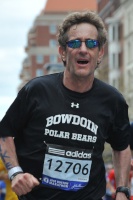
mountandog- Explaining To Spouse

- Posts : 1398
Points : 7906
Join date : 2011-07-14
Age : 67
Location : Michigan
 Re: From today's WSJ
Re: From today's WSJ
Yes, this is major news, different than other studies.
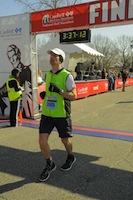
JohnP- Explaining To Spouse

- Posts : 1226
Points : 6585
Join date : 2011-06-15
 Re: From today's WSJ
Re: From today's WSJ
It seems to me that the research really helps clarify what type of running is optimum for health and longevity: Running only moderate distances (20-25 mpw) and not pushing the pace too hard (slower than a 7:30 pace).
I don't think the results should come as that much of a surprise. Most experienced runners will acknowledge (grudgingly) that you don't need to train for a marathon - or the case of this article, a fast marathon - to enjoy health benefits this activity provides. Running fewer miles per week at somewhat of a lower intensity might even be better over time simply due to the fact that it reduced the chances for overuse injury - which means those runners spend less time sidelined and therefore maintain the consistency so vital to masters runners.
I don't think the results should come as that much of a surprise. Most experienced runners will acknowledge (grudgingly) that you don't need to train for a marathon - or the case of this article, a fast marathon - to enjoy health benefits this activity provides. Running fewer miles per week at somewhat of a lower intensity might even be better over time simply due to the fact that it reduced the chances for overuse injury - which means those runners spend less time sidelined and therefore maintain the consistency so vital to masters runners.
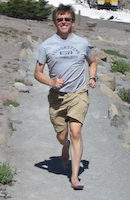
Mark B- Needs A Life

- Posts : 8143
Points : 19854
Join date : 2011-06-15
Age : 60
Location : Vancouver, Wash.
 Re: From today's WSJ
Re: From today's WSJ
Mark, I do think the results in the article are a surprise. I agree we have always known training for a marathon is too much for general fitness, but this seems to indicate training is bad for you. Before, it was just running the marathon that was bad for you.
"Running too fast, too far and for too many years may speed one's progress toward the finish line of life,"
The other surprise is the intensity issue that you mention. That I don't understand at all. They list a hard value yet we know everyone has different genetics. I struggle with a 8:00 mile pace in a marathon (have never done it) but others can easily handle it. I am not sure how they generalized to that time when a particular pace is highly individualized as to how difficult it is to different people.
"Running too fast, too far and for too many years may speed one's progress toward the finish line of life,"
The other surprise is the intensity issue that you mention. That I don't understand at all. They list a hard value yet we know everyone has different genetics. I struggle with a 8:00 mile pace in a marathon (have never done it) but others can easily handle it. I am not sure how they generalized to that time when a particular pace is highly individualized as to how difficult it is to different people.

JohnP- Explaining To Spouse

- Posts : 1226
Points : 6585
Join date : 2011-06-15
 Re: From today's WSJ
Re: From today's WSJ
JohnP wrote:Mark, I do think the results in the article are a surprise. I agree we have always known training for a marathon is too much for general fitness, but this seems to indicate training is bad for you. Before, it was just running the marathon that was bad for you.
"Running too fast, too far and for too many years may speed one's progress toward the finish line of life,"
The other surprise is the intensity issue that you mention. That I don't understand at all. They list a hard value yet we know everyone has different genetics. I struggle with a 8:00 mile pace in a marathon (have never done it) but others can easily handle it. I am not sure how they generalized to that time when a particular pace is highly individualized as to how difficult it is to different people.
Fair points. I'd say not that training is bad for you, but that perhaps there might be such a thing as systemic overtraining, where the longterm harm outweighs the possible benefits. The story didn't address anything other than mortality rates, so we don't know what actually happened to those highly trained runners. If you go beyond a sweet spot, are you trading one malady for another, perhaps? I wish the data showed that.
Also, the time issue is a good one. A 7:30 pace might be easy running for some but an impossibility for others. So that's not necessarily a good indicator of strain on the system. Perhaps a study based on percent of HR Max would be more indicative... though difficult to track in a big longitudinal study.

Mark B- Needs A Life

- Posts : 8143
Points : 19854
Join date : 2011-06-15
Age : 60
Location : Vancouver, Wash.
 Re: From today's WSJ
Re: From today's WSJ
I thought it was telling that the reporter noted disparity among the authorities about the validity of the study. That's often true, but less often emphasized.
The notion that running faster than a particular pace meaningfully altered benefits struck me as unworkable, for the same reason stated above. It's easy for me to conclude that I'm ok because I rarely run faster than 7:30 minute miles, but that's because I can't maintain that pace for much more than a 5k. I'm not jeopardizing my health because I don't run that fast, but someone like Dave O is? That part just doesn't make any sense to me. I would think the study ought to look at some percentage of max heart rate, or a similar measure.
My bottom line was that I think another study will come along with a different conclusion, but since I usually average something between 25 and 30 mpw over the course of any given year, and my typical training pace is quite a bit slower that the benchmark they keyed on, I don't plan on changing anything. But I do think that too much of any good thing can be bad for you... especially as I get older!
The notion that running faster than a particular pace meaningfully altered benefits struck me as unworkable, for the same reason stated above. It's easy for me to conclude that I'm ok because I rarely run faster than 7:30 minute miles, but that's because I can't maintain that pace for much more than a 5k. I'm not jeopardizing my health because I don't run that fast, but someone like Dave O is? That part just doesn't make any sense to me. I would think the study ought to look at some percentage of max heart rate, or a similar measure.
My bottom line was that I think another study will come along with a different conclusion, but since I usually average something between 25 and 30 mpw over the course of any given year, and my typical training pace is quite a bit slower that the benchmark they keyed on, I don't plan on changing anything. But I do think that too much of any good thing can be bad for you... especially as I get older!

Michael Enright- Explaining To Spouse

- Posts : 1521
Points : 6850
Join date : 2011-06-16
Age : 67
Location : Portland, CT
 Re: From today's WSJ
Re: From today's WSJ
For me, 7:30 pace is my usual pace ( when not injured). I usually average 35-42 miles per week. I have been running since 1980. I plan to run like this until my 80's or 90's. I think "Your Mileage May Vary". Just my opinion.
 Re: From today's WSJ
Re: From today's WSJ
Michele "1L" Keane wrote:Whatever. I've been running since 1978, and I'm not dead yet.
 Re: From today's WSJ
Re: From today's WSJ
Seems the real missing data relates more toward personality types than the actual exercise parameters. It is generally assumed that those who run extreme mileage or always run fast have a significantly different personality type than those who are 'more casual' runners. The aggressive runners tend to be more 'Type A' or OCD-like in their daily lives. That, to me, is a more telling correlary than the exercise itself.
Is it the exercise that has the negative effect mortality, or is the exercise a symptom of a trait that effects overall health?
As usual, it easy to infer a causal relationship to exercise... without asking the deeper question of 'why does a segment of the study population run so much, or so fast?'
That said, I am of the opinion that there is a threshhold of 'healthy running' and there are points that extend beyond what's healthy.
Is it the exercise that has the negative effect mortality, or is the exercise a symptom of a trait that effects overall health?
As usual, it easy to infer a causal relationship to exercise... without asking the deeper question of 'why does a segment of the study population run so much, or so fast?'
That said, I am of the opinion that there is a threshhold of 'healthy running' and there are points that extend beyond what's healthy.
Admin- Admin
- Posts : 889
Points : 6182
Join date : 2011-06-14
 Re: From today's WSJ
Re: From today's WSJ
Mr MattM wrote:Seems the real missing data relates more toward personality types than the actual exercise parameters. It is generally assumed that those who run extreme mileage or always run fast have a significantly different personality type than those who are 'more casual' runners. The aggressive runners tend to be more 'Type A' or OCD-like in their daily lives. That, to me, is a more telling correlary than the exercise itself.
Is it the exercise that has the negative effect mortality, or is the exercise a symptom of a trait that effects overall health?
As usual, it easy to infer a causal relationship to exercise... without asking the deeper question of 'why does a segment of the study population run so much, or so fast?'
That said, I am of the opinion that there is a threshhold of 'healthy running' and there are points that extend beyond what's healthy.
Nicely said. Much like the study that showed if you can touch your toes, you're less likely to have heart disease. Related to the lifestyle, not the actual stretching.
 Re: From today's WSJ
Re: From today's WSJ
Michele "1L" Keane wrote:Whatever. I've been running since 1978, and I'm not dead yet.
I think you would be a prime reader of the article. They are saying the impact is mainly to runners like you (and me though you've run much longer than I have). I really feel this article is different than other studies/warnings that are presented. Still, there's not enough data / study yet. Hopefully we'll see more that will refute this initial output.

JohnP- Explaining To Spouse

- Posts : 1226
Points : 6585
Join date : 2011-06-15
 Re: From today's WSJ
Re: From today's WSJ
JohnP wrote:Michele "1L" Keane wrote:Whatever. I've been running since 1978, and I'm not dead yet.
I think you would be a prime reader of the article. They are saying the impact is mainly to runners like you (and me though you've run much longer than I have). I really feel this article is different than other studies/warnings that are presented. Still, there's not enough data / study yet. Hopefully we'll see more that will refute this initial output.
I did read it, John, and I must say that although I have been a runner for many years - I stopped seriously competing in 1992, and then repicked up running races in 2000. I wish I could say that I run a lot of miles faster than 8 min per mile - but that would be a tall tale. I actually have a heart murmur that I get checked every year with an ECG, so I am acutely aware of wear an tear.
 Re: From today's WSJ
Re: From today's WSJ
I didn't! I'm just the kind of runner it's talking about and I shall keep a lookout for or any serious research on the subject. However, I shall not be swayed by this one article for a number of reasons:Kenny B. wrote:I enjoyed reading this article.
While I might read the odd article in the Wall Street Journal with interest, it will never be my source of life-changing health information. If it were published in a health or sports magazine, I should be inclined to take it more seriously.
The article quotes no meaningful statistics. It does not say how many of the 52,600 subjects were runners, or how many of those runners ran a lot, or how consistent they were, or what high-mileage threshold they used (20 or 25, and why?). It implies that those who run a lot are more likely to die than those who do not run at all, but it doesn't actually say so.
The article quotes a speed of 8 mph (does any runner use mph?). Several contributors have already pointed out the dubiousness of such a fixed threshold for runners of different abilities. Anyway, practically all my long runs are slower than 7:30 min/mile.
There may be more persuasive material in Heart, but I don't feel like paying $30 for a single article, which does not claim to be definitive.
I do take notice of new information on running and health, which crops up from time to time, and one day I might be persuaded to change my habits, but I doubt whether any of us runs just for health. There would have to be much more definite reasons to persuade me to give up the joy of running (which is not 20 mpw of jogging).
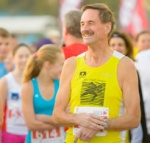
Chris Coleman- Poster

- Posts : 211
Points : 5127
Join date : 2011-07-05
Age : 77
Location : Abu Dhabi
 Re: From today's WSJ
Re: From today's WSJ
Contrary opinion well-stated here:
http://www.runnersworld.com/health/too-much-running-myth-rises-again
http://www.runnersworld.com/health/too-much-running-myth-rises-again

Michael Enright- Explaining To Spouse

- Posts : 1521
Points : 6850
Join date : 2011-06-16
Age : 67
Location : Portland, CT
 Re: From today's WSJ
Re: From today's WSJ
Michael Enright wrote:Contrary opinion well-stated here:
http://www.runnersworld.com/health/too-much-running-myth-rises-again
Ah thank God, or I would have had to run my 12 miler yesterday and my 9 miler today backwards this week to make up for them. Whew.

mountandog- Explaining To Spouse

- Posts : 1398
Points : 7906
Join date : 2011-07-14
Age : 67
Location : Michigan
 Re: From today's WSJ
Re: From today's WSJ
My brain hurts so I just ran 20 miles to relief that.

fostever- Explaining To Spouse

- Posts : 1572
Points : 8803
Join date : 2011-06-16
Age : 65
Location : Chicago
 Re: From today's WSJ
Re: From today's WSJ
That's more like it. The author admits his bias, takes a closer looks at the facts, and uses logical argument. I think he's right, but even if he's not, he adopts the right approach.Michael Enright wrote:Contrary opinion well-stated here:
http://www.runnersworld.com/health/too-much-running-myth-rises-again

Chris Coleman- Poster

- Posts : 211
Points : 5127
Join date : 2011-07-05
Age : 77
Location : Abu Dhabi
 Re: From today's WSJ
Re: From today's WSJ
http://www.runnersworld.com/health/too-much-running-myth-rises-again
Another take on the original article by the guys over at runningtimes.com. Worth a read for sure!
Another take on the original article by the guys over at runningtimes.com. Worth a read for sure!
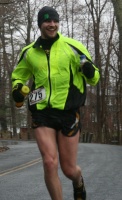
Neil Ruggiero- Poster

- Posts : 112
Points : 4823
Join date : 2011-06-18
Age : 36
Location : Western Massachusetts
 Re: From today's WSJ
Re: From today's WSJ
Neil Ruggiero wrote:http://www.runnersworld.com/health/too-much-running-myth-rises-again
Another take on the original article by the guys over at runningtimes.com. Worth a read for sure!
Hey Neil, I think all this running is affecting more than your heart - look up a couple of posts!!

mountandog- Explaining To Spouse

- Posts : 1398
Points : 7906
Join date : 2011-07-14
Age : 67
Location : Michigan
 Re: From today's WSJ
Re: From today's WSJ
Ha! Woooops! Let's just pretend I didn't post that lol.

Neil Ruggiero- Poster

- Posts : 112
Points : 4823
Join date : 2011-06-18
Age : 36
Location : Western Massachusetts
 Re: From today's WSJ
Re: From today's WSJ
My take on this is in this day and age you can find a study that says anything is bad for you. I personally will never let a study, no matter who conducted it, to influence my running. Just listen to your body and don't ignore warning signs.
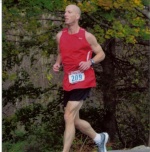
Alex Kubacki- Explaining To Spouse

- Posts : 1252
Points : 6315
Join date : 2011-06-23
Page 1 of 1
Permissions in this forum:
You cannot reply to topics in this forum|
|
|
